The demography of sub-Saharan Africa is one of the megatrends of the 21st century. Africa is the only world region projected to have strong population growth for the rest of the century. According to Pew Research, between 2020 and 2100, Africa’s population is expected to increase from 1.3 billion to 4.3 billion. These gains will come mostly in sub-Saharan Africa, which, even allowing for demographic transition, is expected to more than triple in population by 2100.
Source Pew Research
The Democratic Republic of the Congo, Tanzania, Ethiopia and Angola, along with one non-African country (Pakistan) are all major centers of population growth. But Nigeria is by far the most dramatic.
Conclusion: If we are to grasp the 21st century, we simply HAVE to integrate sub-Saharan Africa, and Nigeria, in particular, into our understanding of global affairs.
Concern: I could hardly be less well-equipped to understand these problems. I collect Nigeria charts pretty assiduously. But I am only too well aware that in this case, even more than others, “statistical reality” and facts on the ground are very different things. So, take this newsletter not as an insiders account of the “real Nigeria”, but as a review of “statistical Nigeria”. Let us call it, Nigeria-s. (PS: you could say the same about China-s. Or indeed USA-s. I’ll return to this in another newsletter)
Challenge for those who know better. I expect and hope to get schooled on this. I’m sourcing everything here to serious outlets. But, tell me what I am missing. Please!
Nigeria’s demographic drama
On current trends, Nigeria will surpass the U.S. as the third most populous country in the world in 2047.
Nigeria is expected to have 864 million births between 2020 and 2100, the most of any African country. The number of births in Nigeria is projected to exceed those in China by 2070.
Currently, total fertility in Nigeria is running at 5 live birth per woman, compared to the global average of 2.5. Given limited medical facilities and prevalent poverty, Nigeria’s women are in the frontline of a spectacular drama.
Today 20% of all global maternal deaths happen in Nigeria. 600 000 Nigerian women died in childbirth between 2005 and 2015 and there were no less than 900 000 maternal near-miss cases.
According to WHO a Nigerian woman has a 1 in 22 lifetime risk of dying during pregnancy, childbirth or postpartum/post-abortion; whereas in the most developed countries, the lifetime risk is 1 in 4900.
Urbanization
Between now and 2050, 35% of all urban population growth worldwide will be driven by India, China and Nigeria.
Source: Visual Capitalist
I don’t want to get into a sensationalist discourse of “planet of slums”, “Maximum city” etc. But, by all accounts, Lagos is a city like no other.
As David Pilling describes it in the FT, “Lagos, the federal capital until government functions shifted to Abuja in 1991, is arguably Africa’s most vibrant, creative and dynamic city. It is a centre not only of commerce and the country’s burgeoning high-tech industry but also of its creative industries, including music, fashion and the Nollywood film industry. Like India’s Mumbai, that makes it a city of dreams. Each day, thousands of people arrive from poorer parts of the country attracted by an economy bigger than that of Ethiopia, a country of 110m people. The city’s expansion has been almost entirely unplanned. In 1960, at Nigeria’s independence, Lagos had just 200,000 people. More than half a century later it has grown 100-fold to around 20m making it one of the top ten most populous cities in the world. By 2040, that could hit 30m.”
200k -> 20 m in 60 years. Those numbers speak for themselves.
A Poor Economy
In its interactions with world economy Nigeria’s economy, the largest in Sub-Saharan Africa, is dramatically undiversified. It lacks what economic geographers call complexity. One commodity, oil, dominates Nigeria’s formal economy and its export trade.
If you take Nigeria’s GDP in 2017 as $400bn - a big if - Nigeria’s trade with the rest of Africa accounts for only $7bn in 2017. That is less than 2 percent and that is on the assumption that GDP is not understated. That makes is comprehensible that Nigeria resorted to closing land border to the movement of goods to stop smuggling.
Source: FT
The oil industry is the main source of fiscal revenue, which makes for an exceptionally narrow tax base.
Falling Behind
Needless to say, none of this is a recipe for economic success. The World Bank recently produced this comparison of Nigeria and Indonesia’s economic development over the last half century.
Source: World Bank
In 1970 Nigeria’s gdp per capita was twice that of Indonesia. Today that economic balance is flipped. Indonesia is now a rapidly growing middle-income country. Nigeria is not.
Nigeria has fallen behind not just relative to Asian competition. It also lags its African competitors too. Ethiopia, in particular, has demonstrated how high investment can drive growth. (Will try to do a similar exercise to this on Ethiopia soon).
Source: FT
Energy Starved Oil Exporter
For lack of investment, Nigeria, a large oil exporter cannot supply its own population with power.
As Reuters reports, currently Nigeria produces huge quantities of crude oil but has no adequate refinery capacity. It has to import petrol and suffers regular fuel shortages. There is a promise that a $12bn refinery will soon open that should produce fuel by 2022.
International comparisons of Nigeria’s energy poverty are mind-boggling.
China’s population of 1.4B ppl use 6500 Billion KWh each year
India: 1.4B ppl use 1500 Billion KWh
Nigeria: 200M ppl use 28 Billion KWh
As @70sBachchan points out, to handle power surges, China disconnects more wind electricity than all Nigerians use!
200 m people generating a GDP $1.1 trillion PPP have only 5.3 GW of large scale power stations reliably connected to grid = Congo/Afghanistan level.
That Nigeria's economy functions at all is credit to the endless capacity for improvisation displayed by its population. It is testament to that that Nigeria has amongst highest GDP per GW of grid power in world! In other words the system is grotesquely inefficient, but Nigerians make the most out of whatever stable on-grid electricity supply they can get.
Source: Dirty Power
For the rest they rely on massed banks of inefficient, polluting, but reliable off-grid diesel generators. Though generators are ubiquitous throughout the world wherever the grid is fragile (more on this in a subsequent post), nowhere is more dependent in proportional terms on “backup” power than Nigeria/West Africa.
Source: Dirty Power
No Work
Given the huge population growth, unemployment is a chronic problem.
Source: World Bank
Nigerians get by in an "underground”, “hidden”, “shadow” or “grey”, economy that by some estimates accounts for 50-60 percent of total economic activity.
Poverty
But for all the dynamism and drive, for all the success that many achieve, some 94m people in Nigeria live on less than $1.90 a day, more than in any other country in the world.
By 2030 a quarter of all very poor people on the planet will be Nigerian, predicts @worlddatalab.
Source: Brookings
Migration
Faced with stark circumstances, folks look for alternatives. By 2018 more than half of Nigerians reported that they wanted to leave their country with educated Nigerians expressing the strongest desire to emigrate.
Source: World Bank
Between 1990 and 2019 the Nigerian diaspora surged from 0.5 to 1.5 million with the US and the UK becoming new homes for one third of the migrants.
Many cannot find a legal route and resort to paying extortionate fees to people smugglers.
Not for nothing the most World Bank Nigeria Development Update December 2020 concludes with a section on: “Making the most of young Nigerians’ economic potential: The case for more and better managed international labor migration from Nigeria”




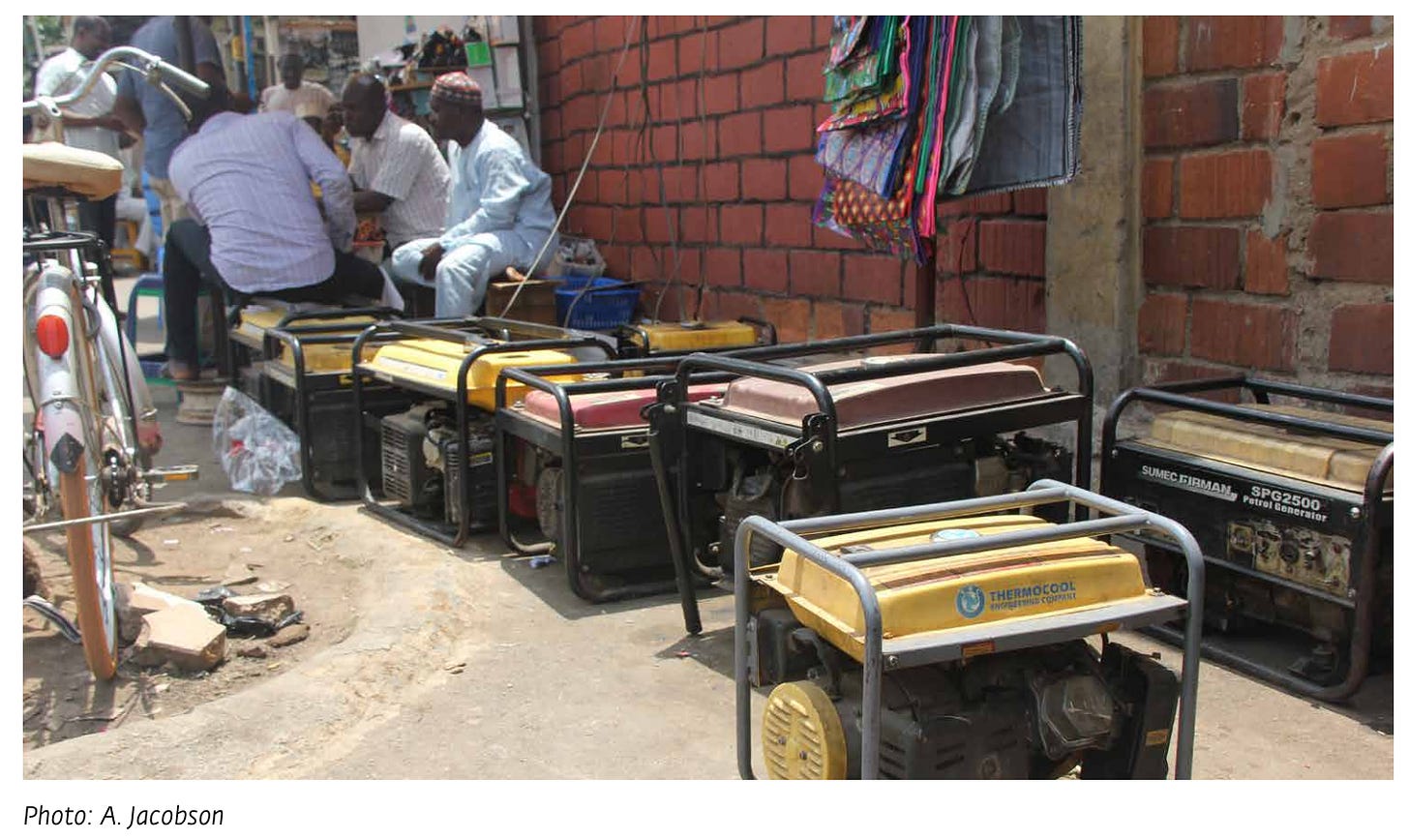


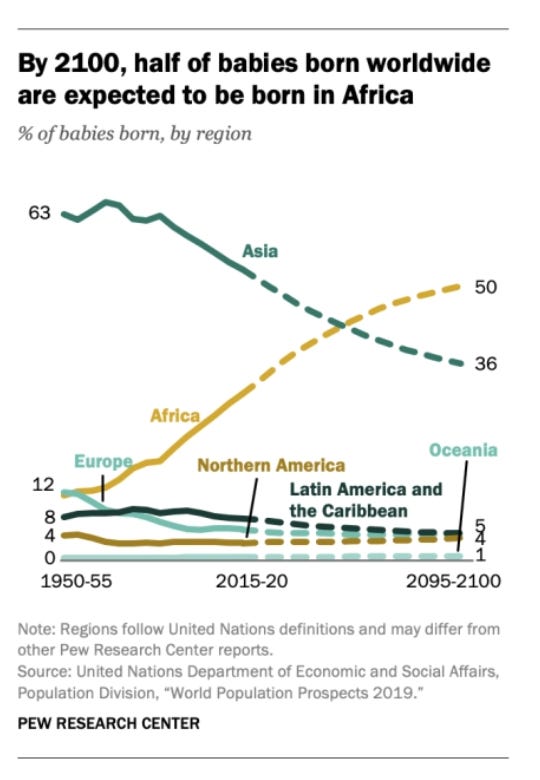


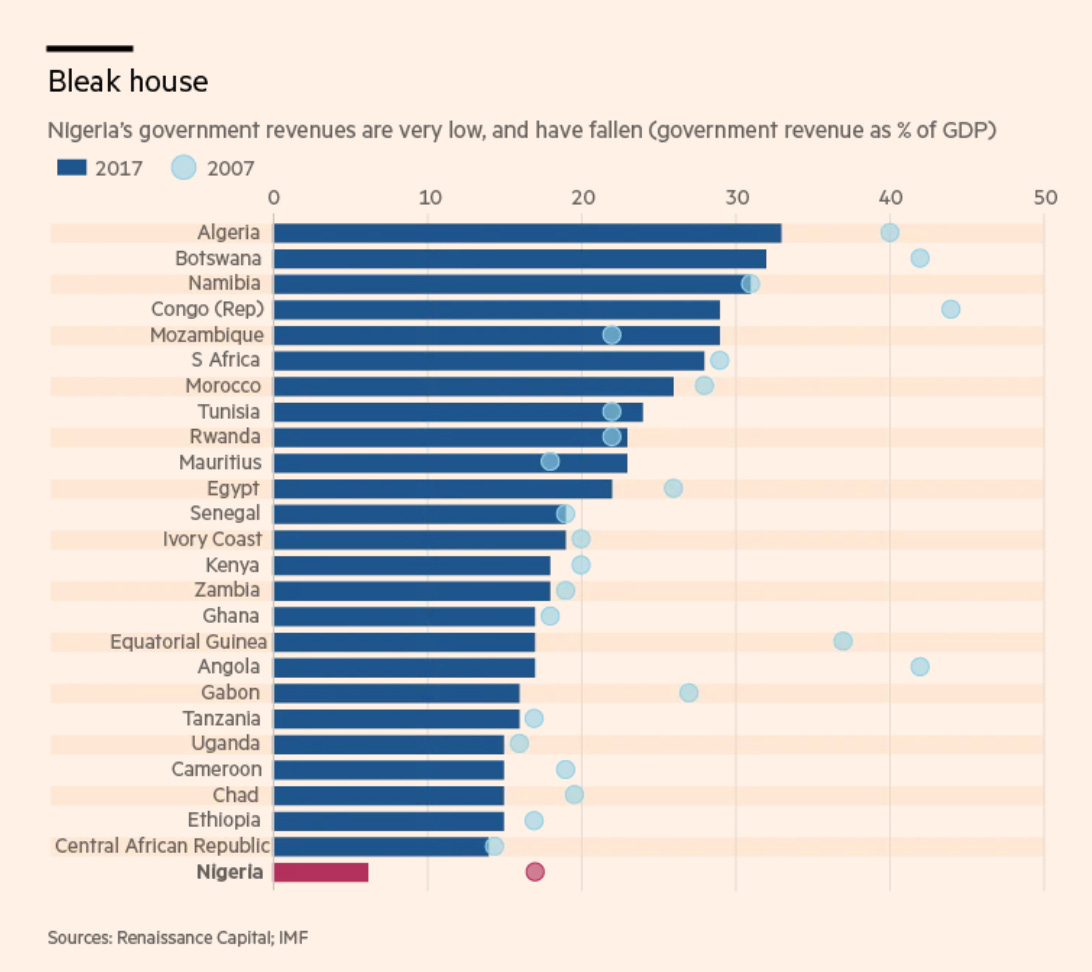
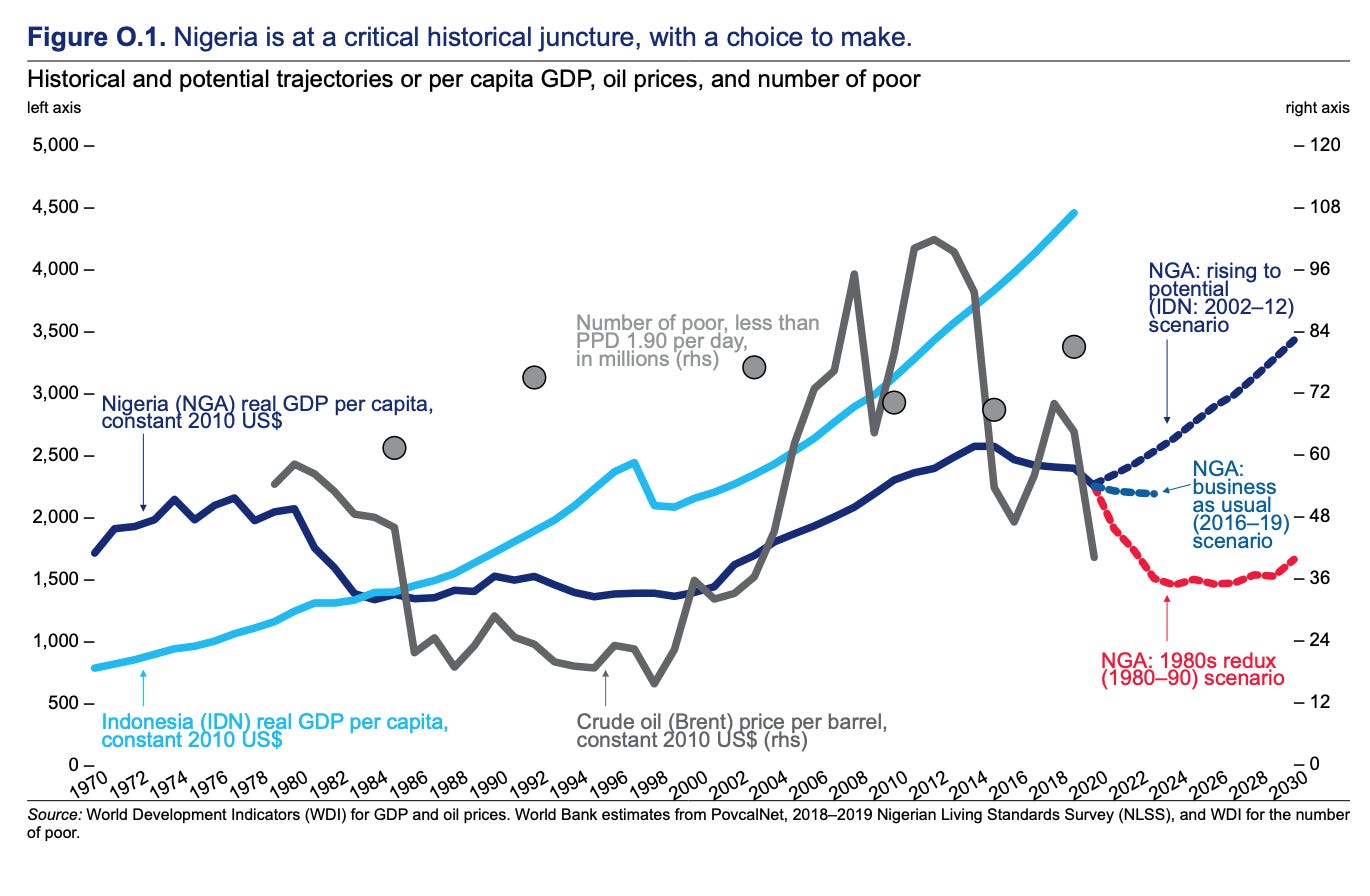
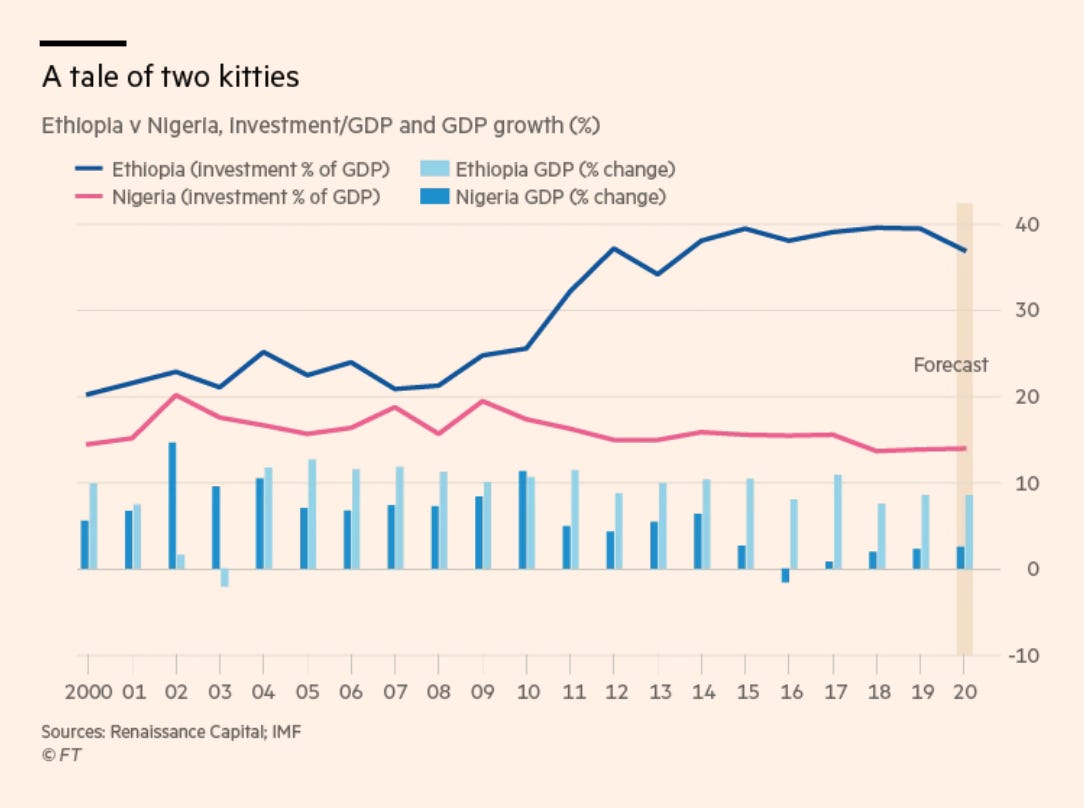
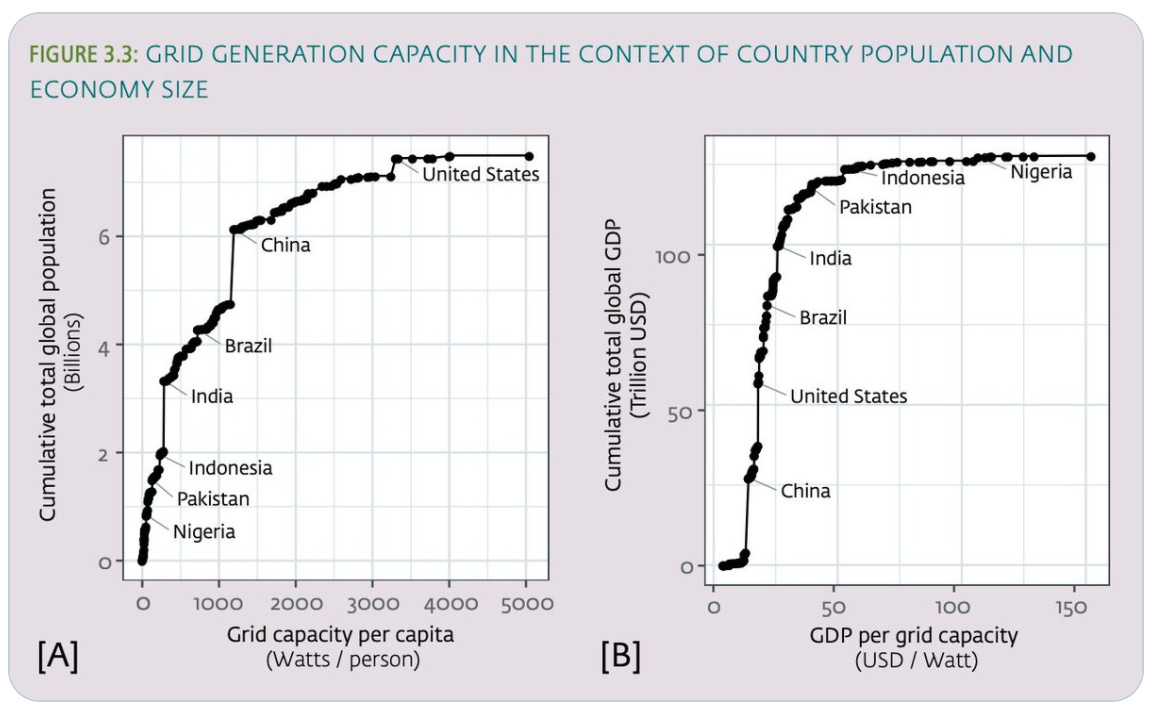

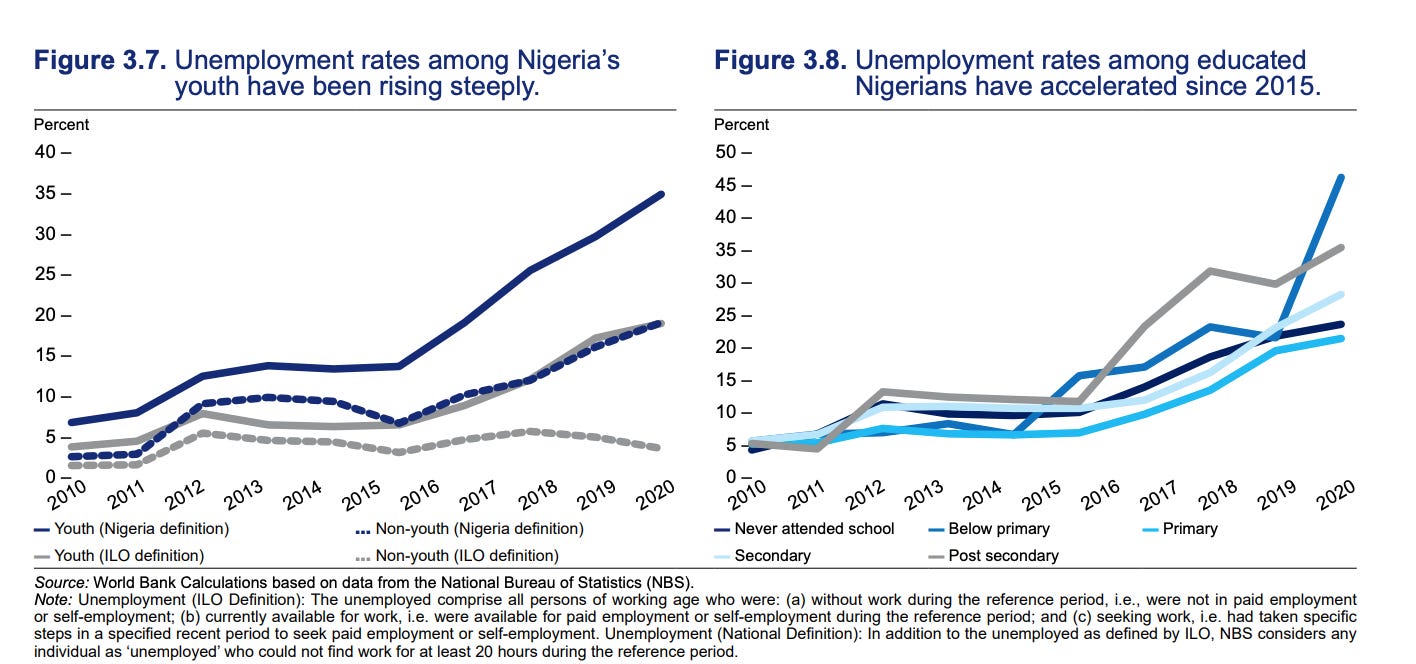

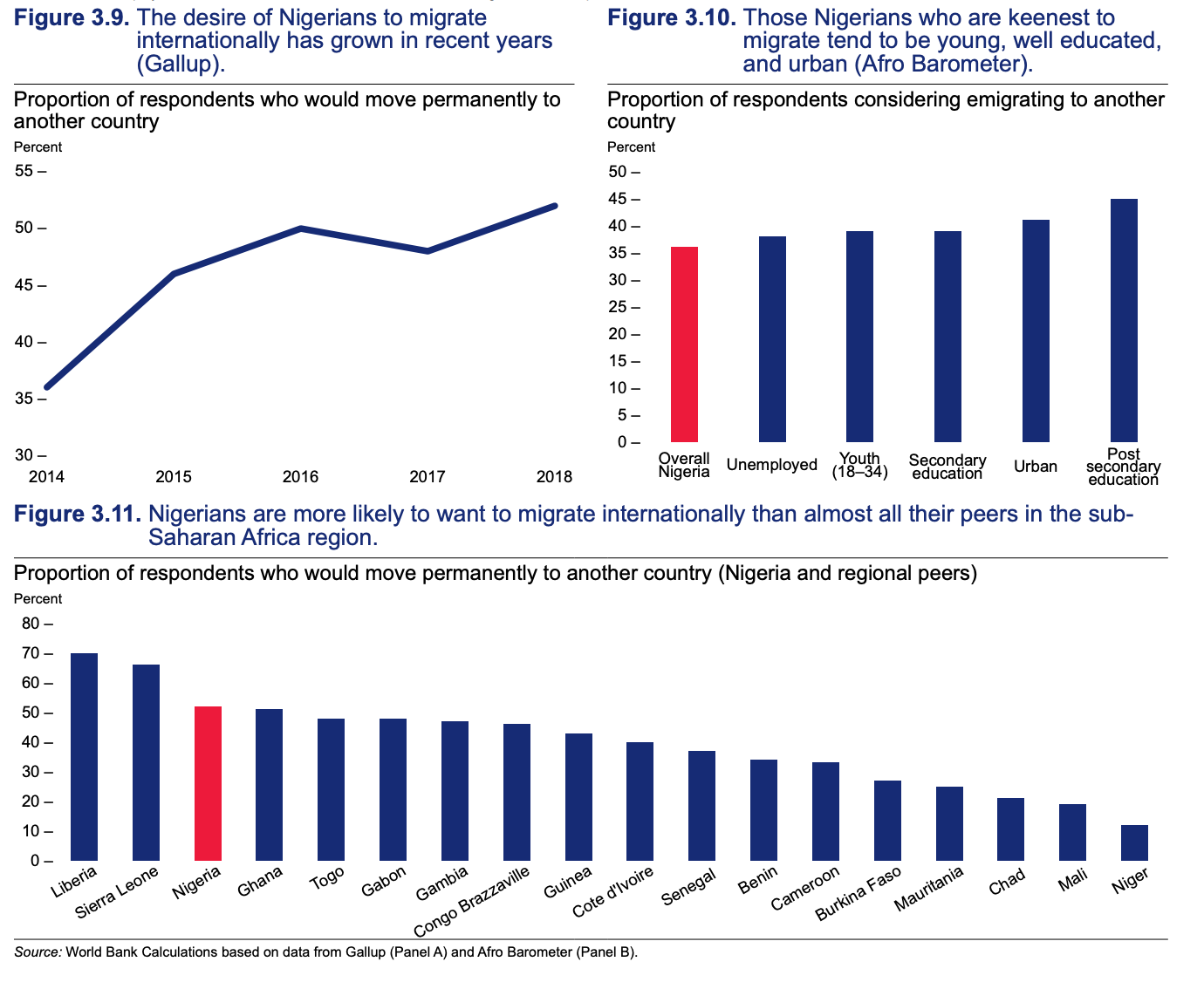
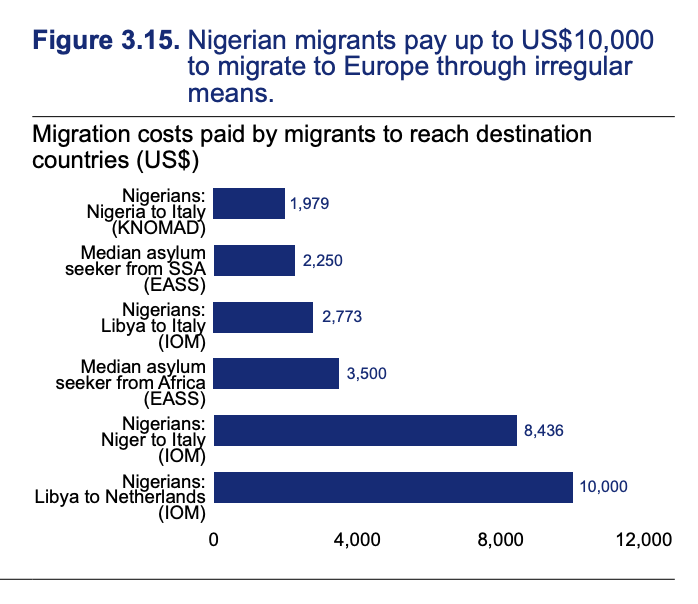
This is an awesome piece. But I have few comments to make .
1. Viewed critically , the Nigeria’s economy is a combination of economies within an economy. Nigeria runs a federal structure but power ( economic, political and military) is more situated at the center which makes some section of the country to constantly yearning for a proper fiscal federalism.
2. Flowing from one above , most of the central statistics above Nigeria masks a great deal of variations within the economy. If disaggregated, the truer pictures of the sub national structures will unfold.
3. Nigeria’s fiscal operations is heavily influenced by oil revenue. As you correctly wrote, narrow tax base in completed by the oil revenues. But decades of oil deposit has not had markedly positive effects on the lives of the people expect for some few people with access to the National purse.
In addition, the Federal Government derives about 60% of its revenue from oil sales ; while for a large number of states , oil constitutes about 80% of revenue. Nigeria has 36 states and federal capital territory in Abuja
4. Sadly, Nigeria has not come up with a strategy to navigate a future without oil. In a world of renewable energy, what will happen to the Nigeria fiscal operations?
5. Nigeria has good comparative advantage in Agriculture. Agriculture accounts for about 25% of its GDP . Though there has been some improvements in Agriculture output , yet the productivity level is still poor and Nigeria has not taken a real move towards more exports. Maybe the new Africa Continental Free Trade Area ( AfCFTA) will turn things around for the country but productivity needs to improve .
6. Nigeria has witnessed a considerable growth in its service sector in the last 20 years . Service sector now accounts for more than 50% of the GDP. The growth in Telecom sector has fueled the increase in the service sector. More Nigerian youths are getting trained in IT . More youths especially in Lagos are getting into software development, data scien, AI . They are setting up Start up companies ( fintech , agrictech , etc ) which have been attracting interest from Venture Capitalists , Angel investors and Private Equity Firms both home and abroad . Nigeria youths are forging ahead despite the absence of the needed electricity as you mentioned.
7. Two key areas need massive and consistent investment. They are education and health. You hinted at the sad state of health in your piece already. But let me talk about education . They are more out of school children in the Northern Nigeria than elsewhere in the continent if not the whole world . Few students that attend schools are being kidnapped. Some are killed . The public universities in Nigeria which cater for a large number of students have remained shut for about a year now. The University labour union wants the government to spend more in the tertiary education sector , especially for its fulfilment of an agreement it signed with the labour union in 2001 . This is a serious challenge for the country. If Nigeria is to witness its potential; its education sector needs massive investment and an holistic overhauling.
8. Diaspora Remittances ( DR) from Nigerians abroad constitute a significant source of incomes for Nigerian at home. It has averaged about $23 billion annually. In 2018, DR dwarfed oil revenues in Nigeria. DR is a positive outcome of Nigerians migrating out of the country. We can call it “BRAIN GAIN”. If DR is removed or stopped considerably, the Nigerian economy will enter into a prolonged depression.
9. Nigeria’s democracy is expensive to run. Bureaucracy , public servants and politicians eat off the largest chunk of the budget. And their population is a minuscule compared to the entire population. About 70% of the annual budget is spent on Recurrent Expenditure( including debt service) both at Federal and State Levels; while the remaining 30% goes to Capital Expenditure. This is not sustainable in the long run if Nigeria is to increase its potential GDP.
10. Nigerians , especially youths in the informal sector continue to forge ahead despite the unfriendly environment. All what they want is conducive environment. They want an environment in which the public infrastructure is solid and growing. They want peace and security. They want robust education.
11. There is a issue that you left out: corruption. Official corruption is still rife. With more social actors and awareness against corruption, it may be fought .
However, illicit funds still leave Africa and especially Nigeria. They find home in the Western banks . This is not right . Western governments can not be lecturing Africa about corruption while the dollar proceeds of corruption rest peacefully in their banks . I don’t think I will exonerate the Western government connivance in this case . They remain an accessory to the looting going on in Africa so long they make their banks a resting abode for the corruption proceeds .
Many thanks for this nice piece .
Shola , a Nigerian, wrote from Lagos , Nigeria
Twitter : @ Obzzzy
Great .